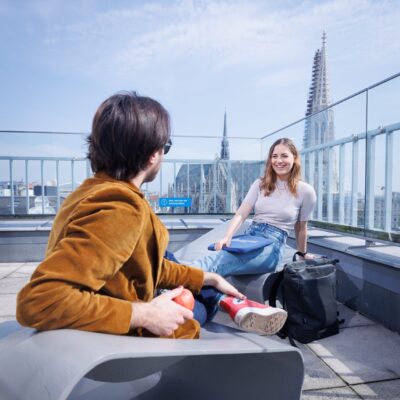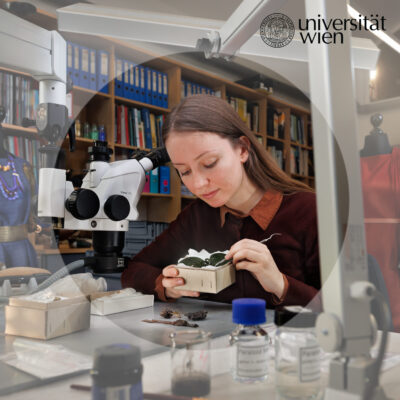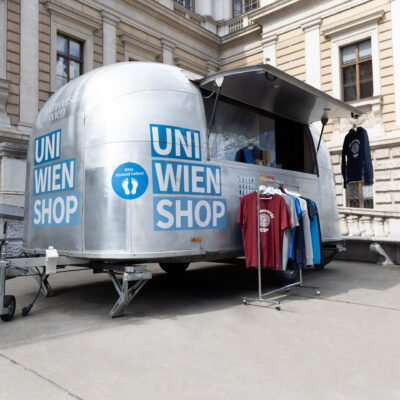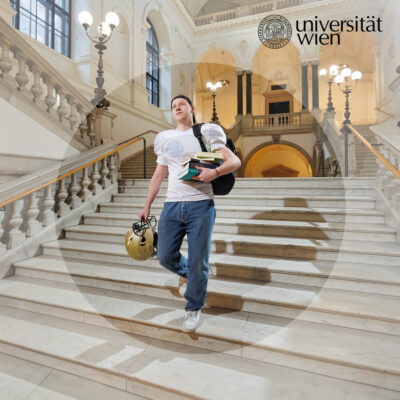Zum Start der neuen Semesterfrage „Aus welchem Stoff wird unsere Zukunft sein?“ haben wir im Vorlesungsverzeichnis geblättert und eine Auswahl an Lehrveranstaltungen rund um Materialforschung zusammengestellt.
Porous Organic Materials
Studienprogrammleitung Chemie
Porous organic materials are a class of materials with permanent porosity consisting only of carbon and other light elements, such as H, O, N and S. Their metal-free structures presents some exciting prospects for sustainability and a move toward sustainable functional materials. Porous organic materials can take the form of multi-dimensional porous networks built via strong covalent linkages between various organic building blocks or discreet individual „cage-like“ molecules. The field of porous organic materials is growing rapidly owing to a wealth of potential applications including but not limited to separation and storage, catalysis/photocatalysis, medicinal applications, and energy storage.
Where porous materials can make an impact: 7 chemical separations to change the world
Studienprogrammleitung Chemie
More energy efficient methods for the purification of chemicals may save many millions of tonnes of CO2 emissions annually and enable new sources of materials to be exploited unfortunately, alternatives to distillation, such as separating molecules according to their chemical properties or size, remain underdeveloped and/or expensive to scale. Engineers need to develop better separation techniques that do not rely heavily on heat. This course highlights seven chemical separation processes that, if improved, would reap great global benefits.
Modern methods for materials characterization
Studienprogrammleitung Chemie
Modern methods for characterisation of in/organic materials, solid catalysts, nanostructures, porous materials and composites, including the interface between materials. These include gas physisorption/chemisorption, porosimetry, spectroscopy for solids and diffraction/scattering techniques. Furthermore, methods for the characterisation of materials in the wet state, such as electrokinetics, will be discussed. Modern methods for physical and chemical surface characterisation; adsorption and sorption.
Nanotechnologie: Konzepte, Methoden, Materialien
Studienprogrammleitung Physik
Ziel der Vorlesung ist es, eine fundierte Einführung in die physikalischen Grundlagen und Konzepte der Nanotechnologie zu geben. Um die Eigenschaften von Nanomaterialien und deren Anwendungen zu verstehen, werden moderne Charakterisierungsmethoden, sowie Herstellungs- und Manipulations-Techniken vorgestellt.
Weitere Informationen und Termine
Materialwissenschaftliche Mineralogie
Studienprogrammleitung Erdwissenschaften, Meteorologie-Geophysik und Astronomie
Die Vorlesung behandelt die Struktur-Eigenschafts-Beziehungen von bedeutenden Mineralen in ihrer wirtschaftlichen und materialwissenschaftlichen Anwendung hinsichtlich ihres industriellen Nutzens. Berufsrelevante Bereiche der angewandt-mineralogischen Forschung am Beispiel der rohstoffverarbeitenden Industrie sind ebenso Inhalt der Lehrveranstaltung. Die Inhalte umfassen folgende Themen: mineralische Pigmente, mineralische Füllstoffe, Hart-Materialien und Abrasiva, Mikroporöse Materialien, Technologische Silikatmineralogie, Keramische Werkstoffe und Refractories.
Weitere Informationen und Termine
Im Masterstudium „Chemie und Technologie der Materialien“ forschst du an der Schnittstelle zwischen Chemie und Technologie von Materialien. Erfahre jetzt mehr!
Internationale Rohstoffpolitik – zwischen grünem Extraktivismus, Re-shoring & Geopolitisierung
Studienprogrammleitung Politikwissenschaft
Im Zuge der „Zeitenwende“ und der ökologischen Modernisierung rücken Rohstoffe wie Lithium, Kobalt, Nickel oder Kupfer ins Zentrum politischer Debatten. Während die EU die großen Importabhängigkeiten problematisiert und nach Wegen zur Diversifizierung und Sicherung der Rohstoffversorgung sucht, streben rohstoffreiche Länder effektive ressourcenbasierte Entwicklungsstrategien an. Ziel ist es, dass Studierende im Zuge der LV ein kritisches Verständnis des Themenfelds internationale Rohstoffpolitik entwickeln, fähig sind, aktuelle rohstoffpolitische Entwicklungen und Debatten zu analysieren, einzuordnen und Zusammenhänge zu erkennen.
Weitere Informationen und Termine
Earth Surface Dynamics: Landforms, Processes and Materials
Studienprogrammleitung Geographie
The aim of this course is to introduce and explore concepts in relation to the earth surface processes and dynamics. Within this term, participants will understand how to dive into the use of geomorphological tools and apply these effectively within the general practice setting in a selected landslide study case in the region of Lower Austria (Austria). The students will have the opportunity to focus on the analysis of potential impacts, incorporating collected fieldwork information and GIS analysis with the modeling software of r.avaflow in order to model landslide processes.
Weitere Informationen und Termine
Materialienkolloquium: Akten-Berge. Bodenschätze als bürokratisches Wissensobjekt
Studienprogrammleitung Geschichte
Teilnehmende erlernen und üben historische Methoden, indem eine Bandbreite von Schrift-, Bild- und Objektquellen gemeinsam analysiert und in Bezug zu aktueller Forschungsliteratur gesetzt wird. Wie wurden Bodenschätze durch bürokratische und wissenschaftliche Praktiken konstruiert, erschlossen und ausgebeutet? Wir bewegen uns in einer Überlappungszone von Wissenschaft, Wirtschaft und Verwaltung, weshalb historische Materialien aus diesen Sphären gleichermaßen behandelt werden. Geplant sind didaktisch begleitete Recherchen in Archiv und Sammlung des Naturhistorischen Museums, des Technischen Museums sowie im Österreichischen Staatsarchiv.
Weitere Informationen und Termine
Wissen und Materialität: Installative Archive
Studienprogrammleitung Kunstgeschichte und Europäische Ethnologie
Was können Film, Foto, Ton, Text, Licht, Körper und Bewegung gemeinsam, wenn sie aufeinandertreffen? Mit dem Begriff „Installative Archive“ interessiert sich das Seminar für Raumkompositionen, die mit den Potenzialen von Archiven arbeiten. Installative Archive finden sich in Wissenschaft, Museum, Büchereien, Unternehmen, Vereinen, Gallerien etc. Es sind temporäre Zugriffe auf historisches Material, die spezifische Themen oder Methoden öffentlich machen. Anhand unterschiedlicher Beispiele aus Wissenschaft und Kunst diskutiert das Seminar, welche Charakteristika „Installative Archive“ aufweisen, wie sie sich von anderen Raumkompositionen abgrenzen, welche emanzipativen Dimensionen diese multimodal und temporär veröffentlichten Erinnerungsmaterialien aufweisen.
Weitere Informationen und Termine
Thinking with Things: Anthropological Approaches to Material Culture
Studienprogrammleitung Kultur- und Sozialanthropologie
This course examines anthropological approaches for the study of the material world. From nineteenth century comparative method to contemporary studies of mass consumption, scholars have looked to material culture for anthropological insights. Focusing specifically on objects held in ethnographic museums but setting this in the wider field of material anthropology studies, the course asks: how we learn from and with things? Students will also choose, research, and present on an element of the material world.
Weitere Informationen und Termine
Eine Gesamtübersicht aller aktuellen Lehrveranstaltungen an der Universität Wien bietet das Vorlesungsverzeichnis u:find.
Mehr Beiträge zu Materialien sind im Wissenschaftsmagazin Rudolphina zu finden.









